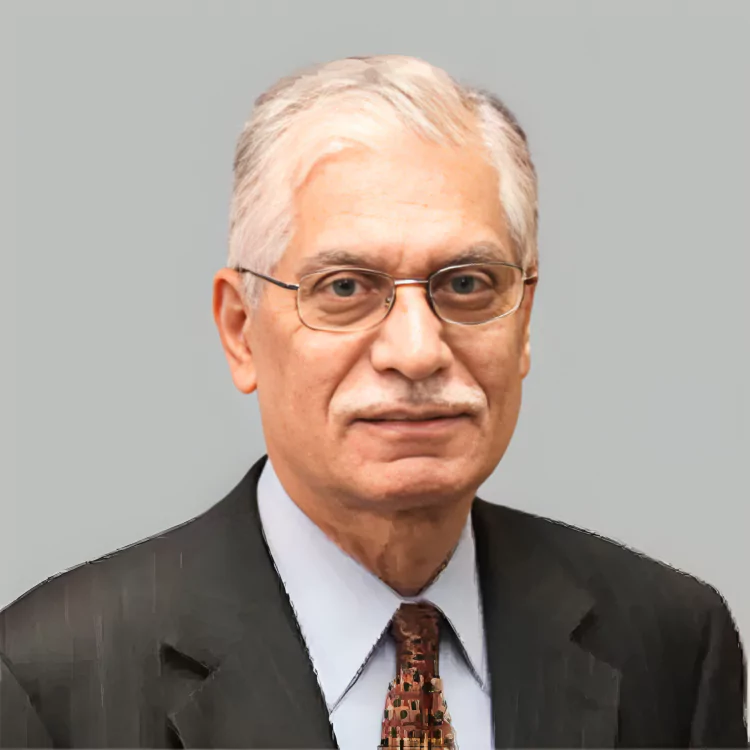
Professor Narinder Kakar
Professor Narinder Kakar has devoted over 50 years of his professional career to programmes related to development activities – more specifically to sustainable development and climate change, and to education for peacebuilding, firstly through service with UNDP and then IUCN, the world’s largest and oldest environmental network. Has been dedicated to the cause of sustainable development all his life, having worked for UNDP for over 30 years in countries such as Yemen, Guyana, Turkey, China and Maldives. Was awarded golden plaque in recognition of his dedicated service and contributions to “world development” by the UN.
Observer of IUCN to the UN and promoted the cause of environmental conservation including climate change. Has had on various occasions advocated the cause of environmental protection at the UN General Assembly attending various high-level events and Summits. Such opportunities to speak to the representatives of all the countries are accorded to professionals on an exceptional basis.
One month before the UN Conference on Sustainable Development (UNCSD – Rio+20) was held in Brazil in June 2012, a high-level thematic debate of the UN General Assembly discussed two key issues for the “Road to Rio+20 and Beyond.” The President of the General Assembly designated Mr. Kakar to chair and moderate the discussion with UN Member States on identifying UNGA’s potential role in following up UNCSD recommendations. Asking a non Member State professional to chair the meeting was an exception.
Professor Kakar served as the moderator of the panel, which included, inter alia, Rajendra Pachauri, the then IPCC Chairman. NK participated and contributed actively in 2013/2014 in the deliberations of the UN Open Working Group on Sustainable Development in the process for the formulation of the Sustainable Development Goals (SDGs), a blueprint for peace and prosperity for people and the planet. The 17 Sustainable Development Goals (SDGs) are an urgent call for action by all countries – developed and developing – in a global partnership. They recognize that ending poverty and other deprivations must go hand-in-hand with strategies that improve health and education, reduce inequality, and spur economic growth – all while tackling climate change and working to preserve our oceans and forests.
Given his exceptional proficiency in the area of sustainable development, he conceptualized the framework for the book on FULFILLING THE SUSTAINABLE DEVELOPMENT GOALS – On A Quest for a Sustainable World (ISBN 978-0-367-70027-0). It is a comprehensive assessment of the progress in implementing the SDGs. The book, which was published by the British publishing house Taylor and Francis Routledge group, was conceived and developed by Mr. Kakar for the Global Center for Environmental Legal Studies of the Elisabeth Haub School of Law at Pace University. He also served as a co-editor of the book, along with Prof. Nicholas Robinson of Pace Law School and Prof. Vesselin Popovski, Dean of the Law School of Jindal Global University.
In recognition of his contributions to the formulation of the SDGs, a group of civil society organizations in China (under the direction of the Ministry of Civil Affairs) invited Mr. Kakar to deliver the keynote address at an event in December 2015 held in the Great Hall of the People in Beijing to create awareness and support for implementation of the SDGs in China. NK served as the Keynote Speaker in the presence of various dignitaries.
Recognizing his commitment to environmental and conservation issues, the American Museum of Natural History invited Mr. Kakar to contribute to the time-line that the Museum developed on the occasion of opening of the renovated sections of the Theodore Roosevelt sections of the Museum, highlighting Conservation Legacy of the 26th President of the United States. Prominent persons whose statements appear on the Timeline of the Conservation Legacy are former US Presidents Jimmy Carter and Bill Clinton. Mr. Kakar has also served as the Permanent Observer to the UN of the University for Peace, an institution established by the UN General Assembly. Apart from teaching courses about the United Nations, he developed the framework of a course on UN Environmental Diplomacy and Sustainable Development and taught it for a number of years. Recognizing his “distinguished academic service,” the University for Peace conferred upon him the title of Professor Emeritus.
He conceptualized manuals on peace education from different perspectives and served as editor of these manuals: “Development, Peace and Security”: Curriculum Manual for South and South-East Asia. ISBN: 978-9977-925-64-6. “Peace Education and Civil Society”: Curriculum Manual for South and South-East Asia. ISBN:978-9977-925-62-2. “Peace Education in Islamic Context.” ISBN: 978-9977-925-60-8
Mr. Kakar also taught the course on UN Environmental Diplomacy and Sustainable Development at Elisabeth Haub School of Law for a number of years. He developed the framework of the course in collaboration with the then Associate Professor Ann Powers, who was the co-teacher for the course. In recognition of his academic contributions, the Pace Law School awarded him the title of Distinguished Senior Fellow. In recognition of his professionalism and the respect he commanded in the System, the UN Secretary-General appointed NK as Chairman of the UN Joint Appeals Board. JAB served as an instrument to adjudicate issues of conflict between the Secretary-General and the staff based all over the world.
